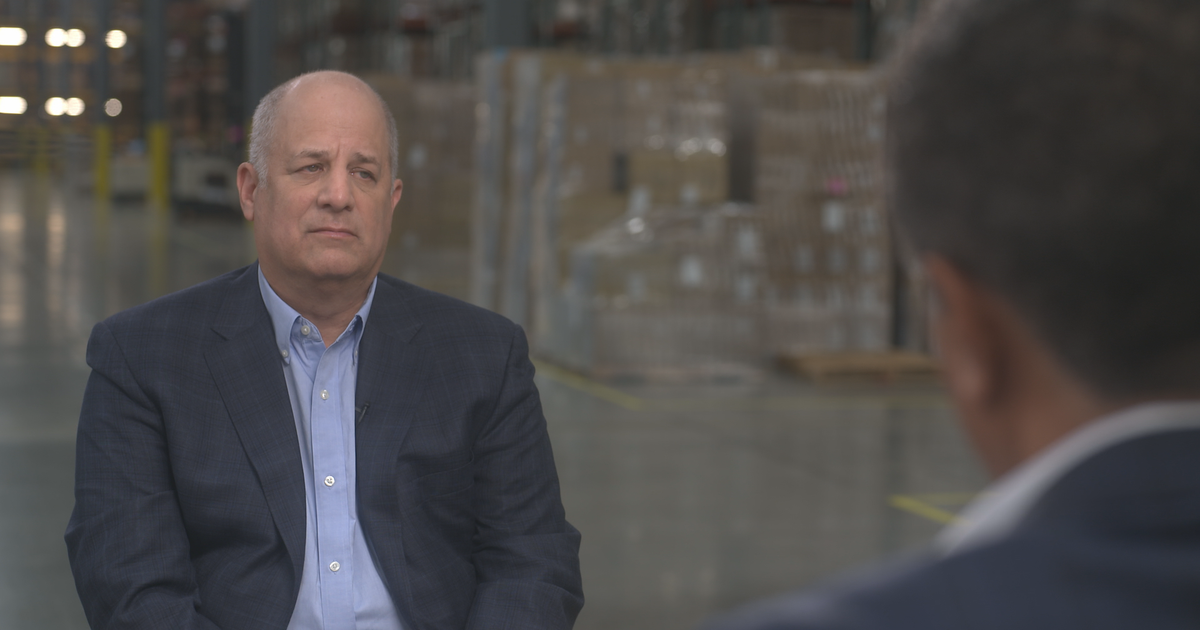Rick Woldenberg says it’s not in his nature, nor consistent with the mission of his Chicago-area toy business, to sit quietly in the face of an existential threat. So last April, a few weeks after the Trump administration unveiled sweeping tariffs on so-called “Liberation Day,” he took action.
Woldenberg sued President Trump and his top advisers, alleging in a 37-page complaint Mr. Trump’s “Liberation Day” tariffs amounted to an illegal “Executive Branch power grab.” After a lower court sided with Woldenberg in June, the Trump administration appealed, and on Wednesday, the Supreme Court heard the case to decide the fate of the president’s signature economic policy.
“I just wasn’t willing to be led to a slaughter by the politicians,” Woldenberg told “CBS Evening News” anchor Maurice DuBois. “So we did what we’re allowed to do, which is to push back.”
Woldenberg heads Learning Resources, which manufactures most of its 2,000 educational toys in Asia. He has taken a path that stands in stark contrast to many top business leaders who grouse privately about the uncertainty wrought by Mr. Trump’s tariffs but stay quiet in public or try to lobby the president behind closed doors.
“I’m not a politician and this is not a political movement,” Woldenberg said. “This is a lawsuit over the interpretation of a law.”
The Supreme Court is being asked to weigh in on whether the president has the legal authority to levy tariffs on a foreign country in order to address a national emergency, such as the fentanyl crisis, illegal migration, or persistent trade deficits, all of which Mr. Trump has cited.
Should the Court uphold his tariffs, Mr. Trump has said the decision would guarantee American prosperity. If Woldenberg prevails, the White House claims economic catastrophe would follow because the administration might be forced to pay back billions to American companies.
Treasury Secretary Scott Bessent said last month the U.S. would have to refund about half of the more than $200 million in tariff revenue collected this year. Woldenberg estimates a third of his 500 employees have had to shift their roles to focus on tariffs. Learning Resources has paid between $5 million and $10 million in tariffs this year so far.
“I definitely want my money back,” he said. “The government has chosen to hit us with a massive tax.”
For years, Woldenberg has fought government attempts to infringe on his business. In 2009, he fought the Obama administration on tougher lead-testing rules in toys. And while he donated $7,000 to the Kamala Harris campaign in the 2024 election, Woldenberg insists his decision to sue the president isn’t political. He has previously given to both Democrats and Republicans.
On a recent Friday morning, workers at the company’s 356,000-square-foot warehouse, north of Chicago, were preparing and loading shipments bound for big box retailers like WalMart and mom-and-pop toy stores nationwide.
Woldenberg says factories in China and Vietnam have unique advantages: labor to assemble items like the company’s ever-popular toddler cash register and source materials for products like “BubblePlush,” a new children’s yoga ball that he expects to do well this Christmas. He said shifting production to the U.S. would be impossible.
“We can’t do it,” said Woldenberg, who took over in 1998 the business his family has run for decades. “And we don’t see our competitors doing it.”
What they have done is play “whack-a-mole,” reacting to almost daily swings in the tariff rate. For example, after Mr. Trump took aim at China, raising the tariff rate to 145%, Learning Resources shifted some production to India. But then in August, the president raised India’s tariff rate to 50%, and Woldenberg raced to ship those products to the U.S to avoid additional penalties.
“It was like a bat-outta-hell emergency,” he said. “And we had until Sept. 16 to clear customs in this country and the boat sauntered in six hours late. So, that cost us 50 grand.”
Along with Woldenberg’s case, the Supreme Court heard a similar case brought by five other small businesses and a group of Democratic state attorneys general. In that case, a federal appeals court ruled many of the president’s tariffs are illegal.
The case is the first in which the Supreme Court will directly decide the legality of one of the most consequential of Mr. Trump’s second-term policies. The high court has weighed in on an interim emergency basis on challenges to many of the president’s initiatives, most recently in his bid to fire Federal Reserve commissioner Lisa Cook.
Woldenberg said he’s confident the Court will grant him relief.
“We and the hundreds of thousands of other similarly situated businesses will get the unlawfully collected taxes rebated to us,” he said.
The U.S. Supreme Court
More

